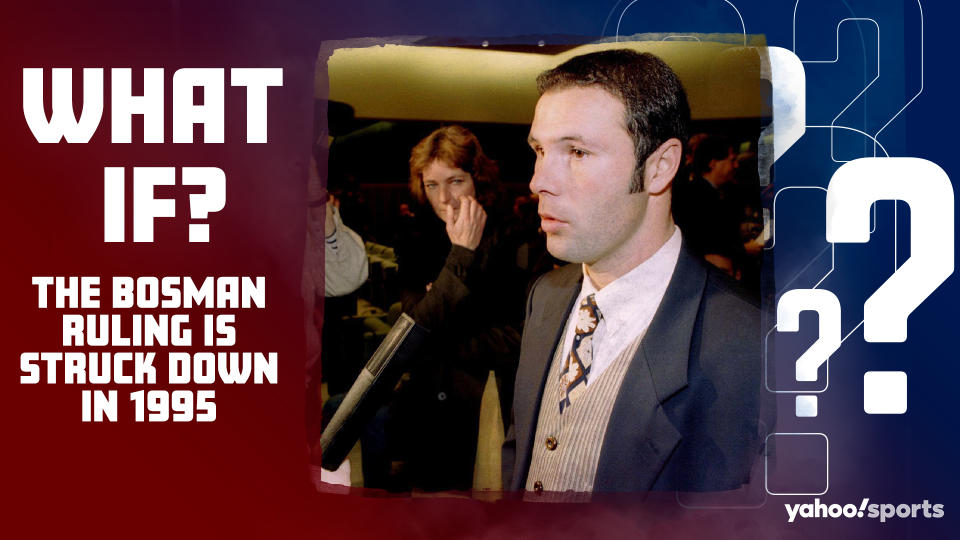What if the Jean-Marc Bosman case is struck down in 1995?

With a loving nod to Marvel Comics, we at Yahoo Soccer decided to ask, “What If?”
In this issue: What if the court ruled against Jean-Marc Bosman in 1995?
If there was an actual, discernible tipping point to separate modern soccer from the previous incarnation of the game, it happened in a courtroom in Luxembourg on Dec. 15, 1995.
The European Court of Justice ruled in favor of Jean-Marc Bosman, a solid but unremarkable professional midfielder from Belgium who had taken his club RFC Liege to court over its refusal to let him leave for Dunkerque in the French League when his contract ran out.
Those were the rules in most countries back then, after all. Even when your contract expired, you were owned by your club. There were some exceptions in a few leagues, but for the most part, the players had no control over who they played for.
But when the ECJ announced its cataclysmic Bosman Ruling, as it came to be known, all of that changed. Not only were European players granted their unconditional free agency upon the conclusion of their contracts, the court also struck down the leagues’ limitations on the number of foreigners clubs could field, as it infringed on the European Union’s free movement of workers. (Restrictions on non-EU players remained.)
The case, which dragged on for five years as it worked its way up the courts, ruined Bosman’s career and, to an extent, his life. But the game was changed forever, swinging the balance of power entirely from the clubs to the players and unleashing globalization on the sport as Europe’s borders were lifted for soccer the way they had for all other forms of labor.
What if the ECJ never rules in favor of Bosman though? What if it decides, as the U.S. Supreme Court once did in favor of Major League Baseball, that soccer was a public good and not a business and deserved an anti-trust exemption? That it was unusual as an occupation and that, therefore, the movement of players had to be restricted to protect its fundamental competitiveness?
It’s hardly inconceivable.

If those judges in the hideous building in Luxemburg City had ruled the other way, soccer might have looked very different. Soccer might still not have full free agency, and might have retained strict limits on foreign players in the domestic and continental leagues.
In such an alternate reality, the power never swings from clubs to players as decisively as it did. And if you unpack that idea, you inevitably reach the conclusion that the very dynamics of the game’s economics are turned upside down.
In actual reality, players are in charge. When they want to leave their club, almost without fail, they leave in fairly short order. If they want to move to a bigger team, they leave. If they’re not happy with their playing time, they leave.If they want a bigger contract, they threaten to leave. They play for a club at their own pleasure.
That’s diametrically opposed to how things used to be and would have still been, were it not for the Bosman ruling. Clubs used to decide who played for them and who didn’t. Who they kept and who they sold. Who they played and who they stuck on the bench, or in the reserves in perpetuity. Players had little choice but to accept whatever fate their clubs had ordained for them. Or to just sign the contracts bestowed on them.
An underappreciated side effect of the Bosman ruling is the impact it had on soccer culture at large. Without full bargaining freedom, the players probably don’t quite blossom into the celebrities they’ve become. They may not have developed their own brands and constructed the commercial entities they have now, with their endorsement earnings sometimes outgrowing even their substantial playing contracts.
Meanwhile, the internationalization of the sport would have been slowed significantly, with most European clubs still capped to three or four foreigners. With the old constraints on player movement, building the superteams we see today becomes a lot harder. Talent pools are smaller, as most of the squad has to be sourced domestically. And that drives up the premium on those players, making it harder to hoard talent.
If Manchester City, say, is only allowed three or four non-English players, the trajectory of its staggering ascent changes completely. Leveling up its squad is a lot harder when restricted to signing only Raheem Sterling, rather than Sterling and Kevin de Bruyne and Sergio Aguero and Bernardo Silva and every other foreign player currently in City’s employ. Presently, City has only five English players on its roster. Liverpool, similarly, would be forced to pick just three of its many foreign stars to keep.
Soccer might have remained more equitable, the gap between rich and poor not quite so vast. The less wealthy domestic leagues in the smaller countries – Belgium, Portugal, Scotland, the Netherlands – might have held up better as European competitors.
But the sport would have been worse for it. Because it would have been less fair. The players deserve their freedom, even if the Bosman ruling also ended the fragile continental competitive balance.
Leander Schaerlaeckens is a Yahoo Sports soccer columnist and a sports communication lecturer at Marist College. Follow him on Twitter @LeanderAlphabet.
More ‘What If?’ from Yahoo Soccer:

